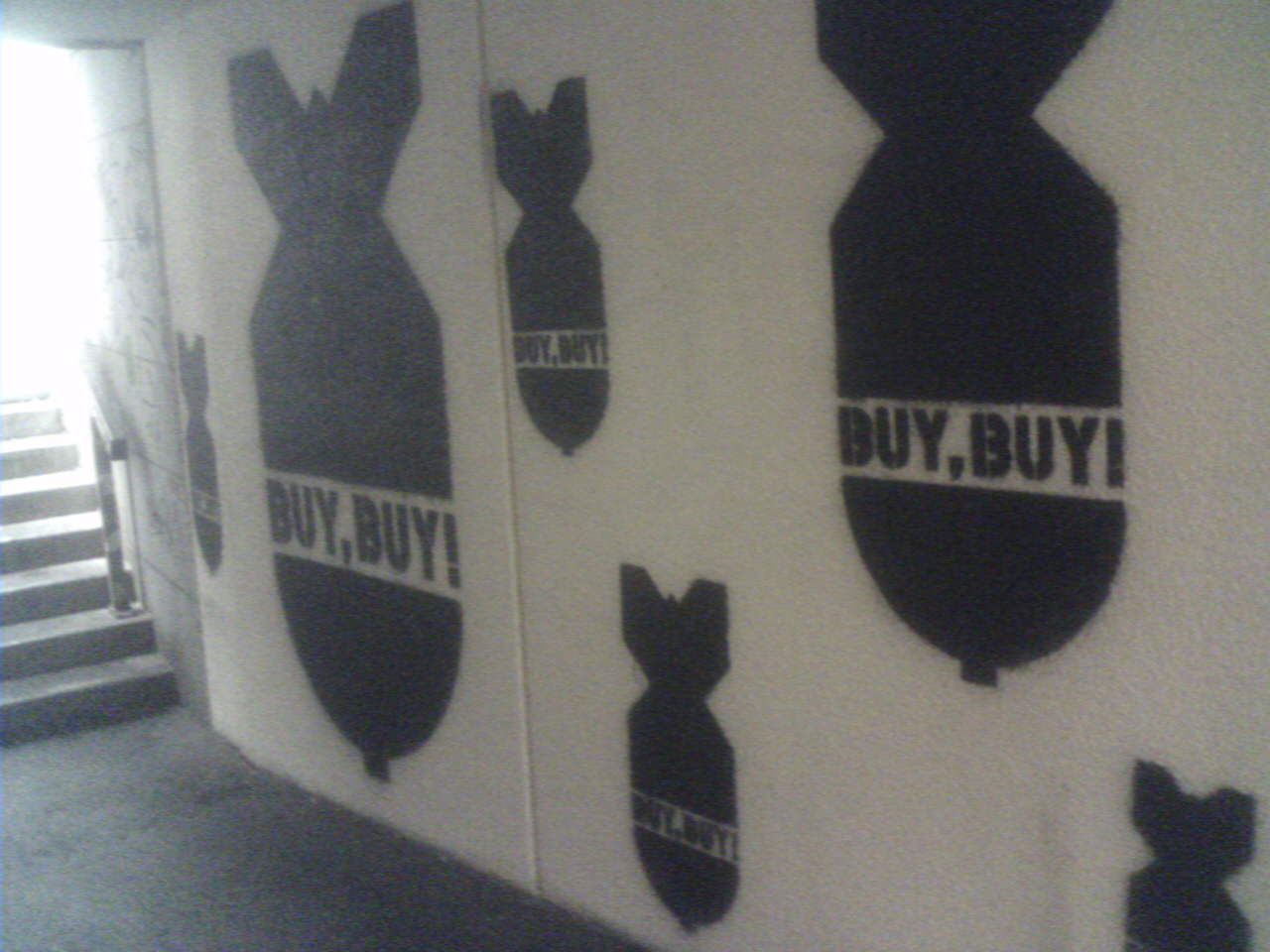Photo by Otto Normalverbraucher, 2005.
It is as if in our cloud capital state, the existential question has become: To sell, or not to sell.
Introducing Anti-sell, which is anti-exploitation. A value to give and receive in mutuality as the alternative.
Say we live under the impending reign of cloud capital. It could be understood that cloud capital rules through the profile. It might also be possible to think of the profile as the logic of spectacle carried into the identity.
The profile is like a self-exploitation platform that serves the interests of cloud capital. Cloud capital is simply data that has been instrumentalized towards control.
Anti-sell is the opposition to spectacle
The concept of spectacle comes from the Situationists. It is the dominating influence of the commodity form that captures narrative understanding. It is the effect of a mode of production and consumption that influences one’s understanding of the world and one’s place within it. For simplicity’s sake I will also refer to it as the material subjugation that is obfuscated through a consumer society.
The consumer society in the era of cloud capital nearly requires an online presence in the form of a profile. Not to have a profile in the era of cloud capital is almost like not having a bank account. It does for sociality what money has done for exchange; it becomes more and more impossible and absurd trying for what used to come easily, or naturally, without the imposition of a medium that for all its virtues, also brings alienation. Sociality and the identity really correlate in ways that interrelate as do sociological categories like the group and the individual. Identity is really produced collectively for it somewhat makes no sense to imagine a person in pure isolation needing to define themselves for a non-existent other person. The identity is really a mechanism for relating, not unlike politics is really an institutionalized governance of relationships.
As the profile is an institutionalized way one relates to a public, the anti-sell profile is a different way of conceiving how to do this. For, one crucial theses we should be aware of about a profile, is that its structure is dictated by the medium it is a part of. The profile is not neutrally or objectively structured but can take on many different forms based on what its platform has been directed towards maximizing. In the case of our era of cloud capital what must always be maximized is profit.
The profitability of a platform essentially comes down to how much time its users spend on it. This generates the current rat race of the cloud capital era that is all about content production. It is the attention economy. Capitalist competition focuses here on who can get the most eyeballs, the most clicks, the most followers, the most likes, the most views, all which translates into ad revenue. The success of content is then inextricably linked to how suited it is for generating ad revenue also conditional on successful sales and profitability, which comes to be entirely controlled by an algorithm. This status quo has become a reality doctrine in itself where people understand they have no control over it but must conform to it in order to survive in the mirror image of what everyone is submitted to under capitalism.
As in capitalism, this structure either produces or is the effect of hierarchical relationships. Competition structures the hierarchy. It is generated through resource scarcity, and in the case of social media and the attendant online landscape, in the era of cloud capital, the main resource beyond data is attention. It is a fairly intangible resource in the sense that while it can be measured, quantified, it is really something akin to time, which has a clear intangibility about it. What makes this resource scarce is effectively the larger society it is situated in where it is linked completely to money, survival. Though attention seems to largely derive out of the flip side of production which is consumption. Largely where people will end up placing their attention will largely, it is my speculation, arise out of a need for escapism, a negative correlation with the excessive work and domination by the capitalist economy in a coercive society.
This leads to another possible first theses for being tactically anti-sell which would be to come to some understanding of how the profile operates on us psycho-sociologically, such that we can subvert or at the very least defend against the deleterious effects it has on us psychologically and socially. A first possible idea about a tactic here would be that slow engagement is critical to dodge the traps of burnout and escapism, which feed into each other.
Movements rather than marketing
Slow engagement is a kind of resistance to the built in mechanism which hooks the psychology in for greater and greater fixes of psycho-physiological responses as engineered to maximize the attention. It could even be seen in some analogy like a correlation with a degrowth concept in the sense that those cancerous aspects of capitalism—unending profit which is actually suicidal; definitely deleterious to well-being—we subvert by being aware of how they operate propagandistically on us, and so we consciously develop tactics and strategies for defending against them at first, and later countering them. In short it is no less than entirely different ways of living and being.
Next to consider in this light is the propaganda of consumerism which is marketing. We should oppose marketing with political movements, with social movements. Really, a social revolution, which means the right to well-being for all.
Marketing has over time hijacked the notion of a political movement to push products. How many times have you heard the term “revolutionary” applied to some brand or some new element of consumerism?
When a political movement is funneled into a brand, and when people are forced to brand themselves, turn themselves into brands through the process of becoming a profile, this I contend is instrumentalized alienation and capture—the turning of people into products; the turning of movements into spectactle—that is the hidden, and not so hidden, chains of consumer capitalism.
A neurotic ego, I speculate, is also operative somewhere here in the function of the isolation of social control; the alienation and domination by the commodity form in consumer society. An ego made neurotic through alienation and domination is perhaps represented in that voice which speaks to the individual in marketing; sorts individuals into demographics to sell to them, and as they sell to us, it is also the mirror image of our being sold.
A movement in contrast is sociality in motion. It is social forms transforming. A movement is never about one individual, but marketing is always about the individual first and foremost, although crucially an alienated individual who is ideally, not at all conscious about what forces cause their most profound source of existential misery, and so products which are a surrogate medicine for such social and cultural afflictions can be perpetually profitable.
If anti-sell is to mean anything it is to point to the cynicism around co-optation and to say that is not an accident. It is to show that in the long struggle against capitalism the cultural movements which give aesthetic life to the struggle are corrupted when they are co-opted, and that the reality doctrine which says this is inevitable is a clear assault on the human mind akin to psychological warfare.
An anti-sell profile is simply an alternative way of conceiving of how an individual and group can and should relate, in a way that is against exploitation, the self-exploitation of the coercive conditions that make it necessary to self-market. Rather than market, one becomes part of a movement. It is not impossible to conceive of strategies of survival, defense—but eventually thriving, and countering—that do not depend on coercive, hierarchical, oppressive, social relations.
The degree to which a behemoth cannot be defeated overnight however often becomes the justification, reinforced through cultures of deep cynicism regarding transformative or revolutionary politics, for inaction, for simply selling.

